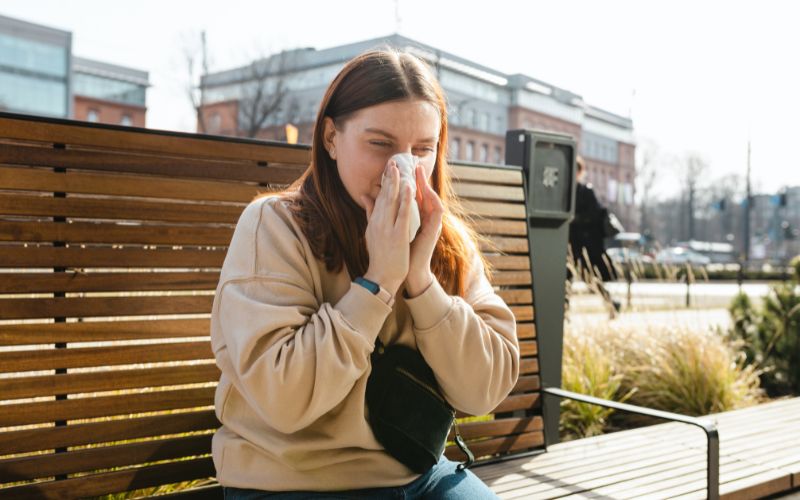Allergies can sometimes cause swollen lymph nodes, this happens when the immune system reacts to allergens, leading to inflammation and an immune response that can enlarge the lymph nodes.
If you’ve ever wondered why your lymph nodes feel swollen during allergy season, you’re not alone. Recognizing how allergies affect your body can make it easier to identify triggers and find the right ways to manage your symptoms.

Swollen lymph nodes caused directly by allergies are relatively uncommon, with infections being the more common cause.
Quick Answer: Can Allergies Cause Swollen Lymph Nodes?
Yes—allergies can sometimes cause swollen lymph nodes. When your immune system reacts to allergens (like pollen, dust, or pet dander), it releases histamine and other chemicals that trigger inflammation. Nearby lymph nodes may temporarily enlarge as they filter irritants and support the immune response. That said, infections are a more common cause of swollen lymph nodes.
Why allergies can lead to swollen lymph nodes.
- Immune system response: Allergens → histamine release → local inflammation.
- Lymphatic system action: Nodes filter allergens and cellular debris and can swell as activity increases.
- Where you might feel it: Most often in the neck or under the jaw, near nasal/sinus irritation.
When it’s more than allergies (see a clinician):
- Swelling lasts longer than 2 weeks or keeps getting bigger
- Fever, night sweats, unexplained weight loss, or fatigue
- Nodes feel hard, fixed, or are in unusual areas (e.g., collarbone)
- Significant pain/tenderness or no clear cause
What you can do now:
- Manage allergies: Allergen avoidance, nasal saline, and appropriate over-the-counter meds (e.g., antihistamines)
- Supportive care: Rest, hydration, warm compresses
- Get medical guidance if swelling persists, is severe, or you’re worried about infection
How Allergies Might Lead to Swollen Lymph Nodes

Can Allergies Really Make Your Lymph Nodes Swell?
Yes, while allergies are not a common cause of swollen lymph nodes, they can sometimes contribute to this condition. Allergies trigger an immune response, causing the body to produce histamine and other chemicals to combat the perceived threat. This immune response can lead to inflammation and swelling in various parts of the body, including the lymph nodes.
Seasonal allergies, food allergies, and allergic asthma are types of allergies that can potentially cause lymph node swelling. However, allergies primarily weaken the immune system, and secondary infections are a more likely cause of swollen lymph nodes in people with allergies.

Lymph Node Swelling and Seasonal Allergies
Seasonal allergies can occasionally lead to swollen lymph nodes. This happens when the body’s immune response to common allergens like pollen, mold, and dust mites is heightened. The lymph nodes may swell as they produce more immune cells to fight off these allergens. However, this is not a common occurrence and is more likely to happen when the body is dealing with a secondary infection due to the weakened immune system from the allergies.

Allergic Asthma and Lymph Nodes
Allergic asthma is another condition that may contribute to swollen lymph nodes. In allergic asthma, the airways become inflamed and constricted in response to specific allergens. This can lead to symptoms like wheezing, shortness of breath, coughing, and chest tightness. The body’s immune response to these allergens can sometimes result in swollen lymph nodes, particularly if a secondary respiratory infection develops.

Lymph Node Swelling and Food Allergies
Food allergies can also potentially cause swollen lymph nodes. When a person with a food allergy consumes a triggering food, their body releases chemicals to manage the invasion.
This immune response can cause inflammation throughout the body, including the lymph nodes. Additionally, food allergies can weaken the immune system, making the body more susceptible to infections that can lead to lymph node swelling.

Sinus Infections and Lymph Nodes
Sinus infections, which are often secondary to allergies, are a common cause of swollen lymph nodes, particularly in the neck. When the sinuses become infected, the body’s immune response can cause the lymph nodes to swell as they produce more white blood cells to fight the infection.
If you have allergies and are experiencing swollen lymph nodes along with symptoms like a runny nose, post-nasal drip, or facial pain, it may be a sign of a sinus infection, and you should seek medical attention.

Lymph Nodes and Pollen Allergies (Hay Fever)
Pollen allergies (hay fever) are common in Pennsylvania, normally starting in mid-August. When the body encounters pollen, it may react by producing an allergic response, such as a runny nose, itchy eyes, and sneezing.
In some cases, this immune response can cause lymph nodes to swell, although this is not a typical symptom of pollen allergies.
The swelling is usually a sign that the body is producing more immune cells to fight off the allergens, and it’s more likely to occur when the body is dealing with a secondary infection due to the weakened immune system from allergies.
Do Not Manage Allergy Symptoms On Your Own
Contact Penn Medicine Becker ENT & Allergy, where our expert team of allergists is ready to provide personalized care and effective solutions.
Managing Swollen Lymph Nodes at Home
If your lymph nodes are swollen due to an allergic reaction, it’s usually not something serious or risky but still not very common. Swelling, in this case, occurs because your immune system is responding to the allergen, which can stimulate lymph nodes as part of the body’s defense mechanism. Here are some things you can do at home:
When Should You Seek Professional Help for Swollen Lymph Nodes?
In some cases, if the lymph nodes remain swollen for a prolonged period, further diagnostic tests may be required to rule out other underlying conditions. It’s important to follow up with an allergy specialist if your symptoms persist or worsen over time. Keep an eye out for the following signs:
Early evaluation can help address potential underlying conditions effectively.
Case Study: Swift Evaluation of a Swollen Lymph Node Led to Early Cancer Detection
Overview:
A patient presented with a painless, enlarged lymph node in the neck. While swollen nodes often accompany infections or allergies, Dr. Frake conducted a comprehensive head and neck exam and determined that the presentation required urgent specialty evaluation. He promptly referred the patient to Dr. Rajashakarin (Philadelphia) for biopsy.

“Dr. Frake examined him thoroughly and referred him… His swift actions led to a quick diagnosis of tongue cancer… Many thanks to Dr. Frake!” — Sue
The Result
Early tongue cancer was diagnosed and surgically treated, avoiding chemo and radiation due to early detection.
Patient: “Sue’s Husband”
Visit Type: Neck mass / enlarged lymph node
Clinical Details:
Outcome:
Personalized Treatment for Swollen Lymph Nodes at Penn Medicine Becker ENT & Allergy
If you suspect that you’re experiencing swollen lymph nodes due to allergies, schedule a consultation with our allergy experts to rule out other health conditions and get appropriate treatment.
At Penn Medicine Becker ENT & Allergy, we provide comprehensive services tailored to allergy sufferers. If you need assistance with swollen lymph nodes, contact us today to book a consultation at one of our convenient locations across Pennsylvania and New Jersey. We also serve the surrounding areas of Newtown, Woodside, Pineville, Levittown, and Doylestown.

